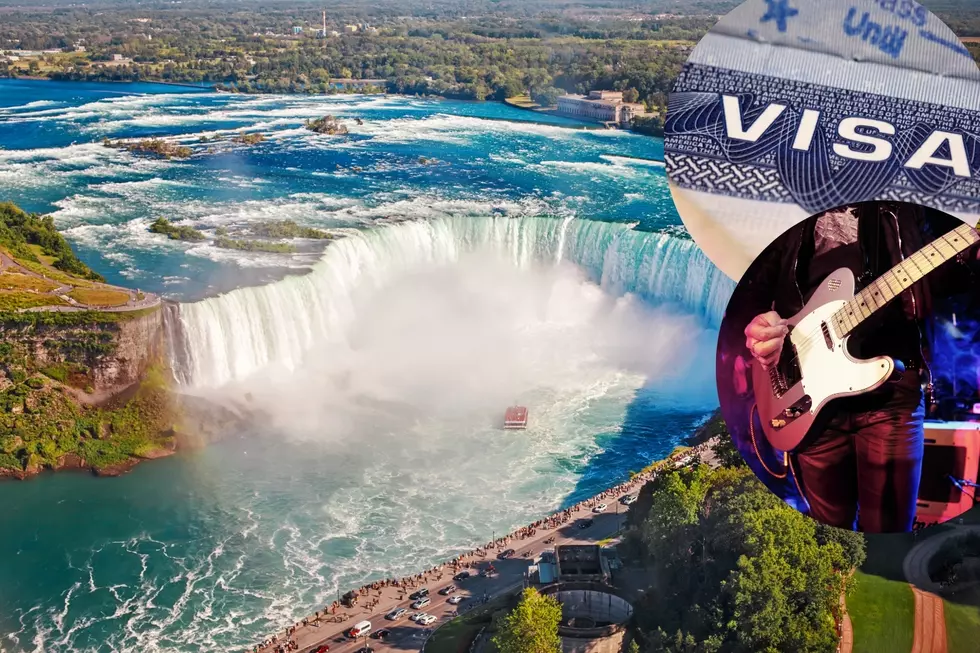
New Border Fees Could Hurt Concert Venues in Buffalo, New York?
New, higher cost of touring visa could hurt Buffalo concert venues.
One of the best parts of living in Western New York is the proximity to Southern Ontario and the ability to see up-and-coming independent bands coming down from Toronto and across Canada. But a new price increase on the cost of a touring visa might put a damper on those opportunities.
On April 1, the cost of the visa used by all touring performers -- musicians, actors, orchestral groups, etc. -- increased from $460 per application up to $1,615 to $1,655, depending on whether the organization applying for the visa is a nonprofit. That’s an increase of 250% per application. If the group needs their visa expedited and processed faster, there’s an additional fee of $2,805 per application, according to the Associated Press.
By this math, a band with six members could pay up to $9,930. If a band makes a few hundred dollars, at most, per show, it quickly becomes a challenge of whether it’s worth it to pay the steep price to cross into the United States and play for a room that may or may not sell out. And that’s on top of the rising cost of touring while fighting to keep all proceeds from merchandise sales, as many establishments take a portion of those sales as a cost of doing business.
READ MORE: Concert Calendar for Niagara Region and Western New York
It’s important to note that bands on tour right now likely had their visas in hand before the price went up, meaning any Canadian bands scheduled to play Buffalo and across Western New York this summer will be covered under the previous price and won’t be forced to make a decision now. But what that means for next year remains to be seen.
“It’s definitely going to keep developing bands from crossing the border,” says one local entertainment booker whose establishments frequently are the Buffalo homes and preferred venues for many Canadian bands. “There are even established bands that don’t play Stateside because it’s just not worth the investment.”
It’s also possible things might not be as dire as this surprising price increase suggests.
Kevin Erickson, director of the Washington, DC-based Future of Music Coalition, says that up to 25 musicians or performers might be covered under a single visa application. Still, the increased price is a steep hike and will likely give performers of all varieties pause when it comes to plotting where they want to take their art.
Why did this increase happen at all? It might not be surprising to know that the price of the visa is set by U.S. Citizen and Immigration Services, a bureau of the Department of Homeland Security, and just like the cost of getting gas and groceries and everything else is rising, the cost of running this particular branch of government is increasing too.
“We receive 96% of our funding from filing fees, not from congressional appropriations,” the office explains in a statement on its website. While Congress provided “much-needed support in fiscal year 2022,” additional funds are needed to work through the backlog of applications. The funding from the visa price increase will allow the office to “keep pace with incoming cases and prevent backlogs from growing.”
If there’s any small silver lining to be found, it’s that hiring more staff for CIS will make it possible to process visas faster, without having to pay that extra $2,805 expediting fee, Erickson said.
READ MORE: Music Is Art Returns To Original Spot In Buffalo, New York
But the bottom line is that artists are still going to be hurt by this, he adds. “It’s just incredibly stupid. This is a casualty and symptom of a bigger political problem.”
Musicians are very concerned about the repercussions of this increased fee. “The proposal to charge higher fees unfairly and unnecessarily burdens the arts community, when the agency should instead adopt common-sense improvements that would streamline visa processing, lower the cost to the agency, and restore confidence in the U.S. artist visa process,” say hundreds of musical organizations and individual artists who signed onto a seven-page comment letter filed with the USCIS earlier this spring, before the fee was finalized.
The touring music and performing industry is still trying to recover following the closure of venues during Covid; this will ultimately make it more expensive and more difficult for these important cultural and artistic exchanges to happen.
“For most bands, this is a real bite. For the vast majority of working musicians, this is a real cost that could be a disincentive to (tour in the United States at all,” says Donald Cohen, founder of the Fan Alliance, a nonprofit organization aimed at helping fans and musicians work together to improve conditions for musicians through things like lower ticket fees, more accurate ticket prices and better rates for streaming services.
“I think disincentivizing cross-border cultural relationships is a really bad thing for America to do,” he said. It’s the opposite of what we should be doing right now, we should be helping foster art and cultural interaction and the ability for artists to travel to other places. We make decisions to incentivize all different things, some things we like, some things we don’t like. Art should be high on the list of things we incentivize more of. This does the opposite.”
Erickson adds that the fee was proposed to be much higher at first, making the new cost a compromise of sorts. This isn’t the government trying to directly and on purpose squash the opportunity to block small bands or touring groups from coming into the United States, but it’s also not going to do anything to encourage these bands either, he said.
“This is just mind-bogglingly stupid,” Erickson said. “Literally nobody thinks this is good. How do we end up in a situation where the government is so unresponsive that we end up stuck with a policy that everyone, every stakeholder, thinks is inexcusably stupid?”
The ripple effects of this change and increase in cost will take a while to be seen. Will there be fewer Canadian shows, or shows from independent and smaller-scale bands from countries outside the United States across the board, in the coming years throughout Buffalo venues? Might these visa fees result in even higher ticket prices in the future?
Author’s note: Several bands and Canadian artist managers contacted for this article either did not respond to a request for comment or requested to speak at a later date; more information will be provided as quickly as possible.
Concert Calendar for Niagara Region and Western New York
Gallery Credit: Getty Images


